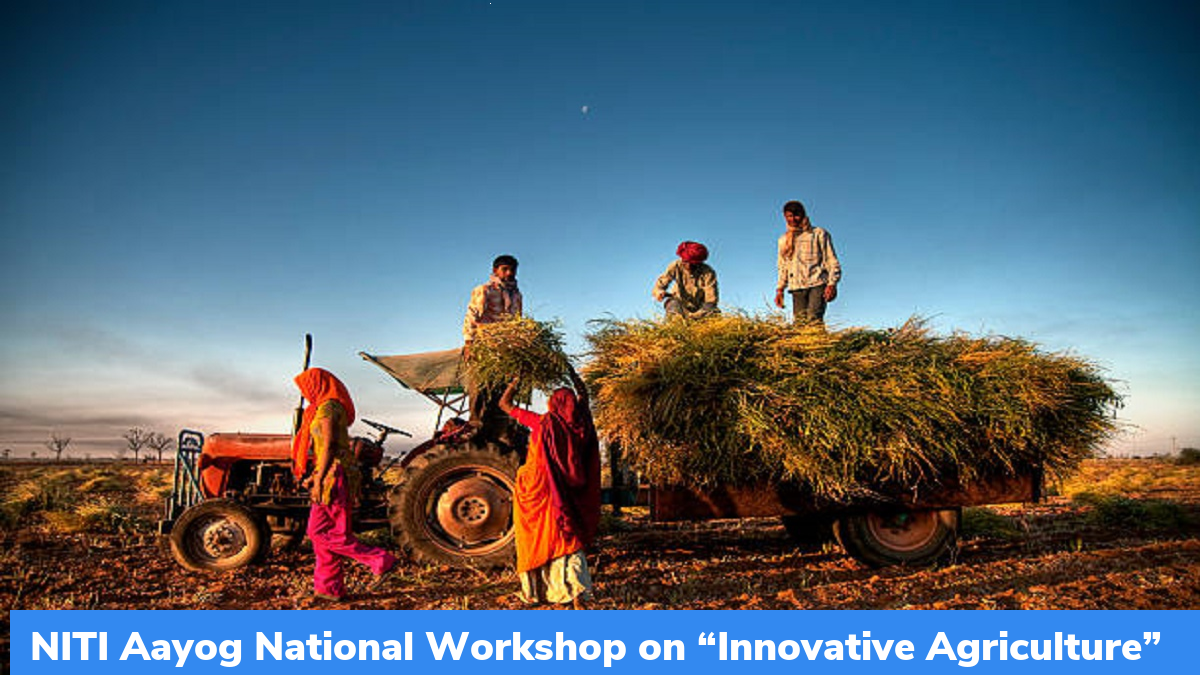NITI Aayog National Workshop on “Innovative Agriculture”
On 25th April 2022, NITI Aayog organized a National Level Workshop on “Innovative Agriculture” in Vigyan Bhawan, New Delhi.
Overview:
- At this workshop the need to understand the fundamentals, science, and processes behind natural farming practices were highlighted.
- The step-wise adoption of natural farming was highlighted.
- The increase in the awareness of good health, nutritious food, and immunity during the COVID-19 pandemic was also highlighted.
- The importance of livestock and cattle to ensure better nutrition was also talked about.
- The central government has been continuously encouraging agricultural practices that reduce the production cost, work in harmony with nature, and ensure good-quality produce as well as profits to farmers.
- The importance of technology and science in natural farming was also highlighted.
How has shifting to natural farming helped?
Shifting to natural farming has the following effects:
- led to a significant cost reduction of cultivation
- improved soil health
- yield enhancement.
Adoption of natural farming will help the farmers to optimize their work and will also be beneficial for the environment.
Aim of the workshop
The workshop aimed to utilize the research experience, knowledge, and expertise of all the international experts who attended the workshop to aid in the capacity building of Indian researchers, scientists, and policymakers towards the promotion of India’s natural farming.
Compendium Release
A bilingual compendium was released during this workshop that contains natural farming success stories. It comprises 110 success stories from across 13 Indian states.
Technical Sessions
This workshop on innovative agriculture had four technical sessions which are:
- panel discussion on natural farming in the states of the country
- natural farming promotion
- natural farming for climate change mitigation and soil health restoration
- Innovations in natural farming.
Panel discussion on natural farming in the states of the country
During this session, the traditional aspects and importance of cow-based natural farming that helps in isolating carbon and improving soil health were highlighted by the CM of Uttar Paresh, Yogi Adityanath. Madhya Pradesh’s plan to promote natural farming on both sides of the banks of River Narmada, and 5,200 villages were highlighted by CM Shivraj Singh Chouhan. Chief Minister of Andhra Pradesh, Y. S. Jagan Mohan Reddy, talked about the need to enhance natural farming research and support from the Centre for natural agriculture in a 90:10 ratio. Pushkar Singh Dhami, CM of Uttarakhand spoke about the state’s status, challenges, and progress in natural farming.
Natural farming for climate change mitigation and soil health restoration
In this session, scientists, academicians, dignitaries, and researchers discussed the need for the promotion of regenerative agriculture strategies with the goal of reversing mitigating climate change via traditional farming systems. They also discussed the importance of the 21st century’s sustainable agro-ecological food systems, the need for green economics in India, and the role that is played by natural farming to make agriculture climate-resilient
Natural farming promotion
In this session, the need for scaling up natural farming, the integration of the resources of the National Rural Livelihood Mission (NRLM), and the role that is played by FPOs and cooperatives to promote the scaling up of marketing networks and the provision of credit support for the purpose of natural farming was highlighted.
Innovations in natural farming
In this session, innovations such as pre-monsoon dry sowing, experiences in the management of crop residue while practicing natural farming, and automation and mechanization for the purpose of applications and input preparations in natural farming were discussed.
Participants
Over 1250 participants from various State Governments, Central Ministries, farmers, industry, research and academic institutions, NGOs, KVKs, delegates from international as well as national organizations from agriculture and allied sectors, and international delegates from Australia, France, and Germany joined this workshop virtually as well as physically and virtually.
Month: Current Affairs - April, 2022
Category: Agriculture Current Affairs • Economy & Banking Current Affairs • Summits and Conferences


